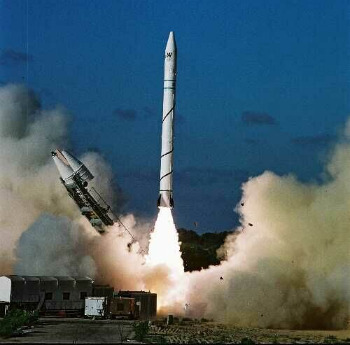Israel is kick starting a national space program with an $80m. injection of cash every year for the next five years. The goal: to create a thriving and lucrative civilian space industry.

For Star Trek fans, space is the final frontier. In Israel it’s the next frontier – to be more specific the next high tech business frontier. It’s no surprise really. Israel already has a lucrative $5 billion a year defense industry, combined with highly developed communications and IT industries. These make a solid base for the leap into space.
| Timeline of Israel in space |
| 1982 –– Israel Space Agency established |
| 1988 –– Ofeq-1 satellite is launched |
| 1990 –– Ofeq-2 is launched |
| 1995 –– Ofeq-3 is launched |
| 1996 –– Ofeq-3 launched with camera, transmitting pictures |
| 1996 –– Israel launched Amos-1 communication satellite on European Space Agency Ariane rocket |
| 1998 –– Ofeq-4 spy satellite launched |
| 2000 –– Eros A1 commercial satellite launched by Russia |
| 2002 –– Ofeq-5 spy satellite was launched on a Shavit rocket |
| 2003 –– Israel’s Amos-2 TV broadcast satellite is launched |
| 2004 –– Israel’s Ofeq-6 spy satellite falls into the Mediterranean Sea after launch |
| 2008 –– Ofeq-7 spysat and a radar satellite known as Techstar is ready for launch |
| 2010 –– Israel launches Ofeq-9, and now has six operating remote sensing satellites in space |
Money is also now forthcoming. The Israeli government has promised an $80 million injection of cash every year for the next five years, in an effort to kick-start a potential $10 billion-a-year business in the world’s $250 billion space industry.
Israel first began looking towards space following the peace treaty with Egypt in 1979. Israel could no longer send aircraft over Egyptian territory to monitor activities in the Sinai desert, so the country decided to use space satellites.
US reconnaissance satellites were not for sale, so Israel had to build its own. In 1982, the Israel Space Agency was established for reconnaissance missions against enemy states Iran, Iraq and Syria. Israel Aerospace Industries (IAI) won the contract, and designed Israel’s first space rocket, Shavit (Hebrew for ‘comet’), and its first artificial moon, the Ofek (horizon) satellite.
In 1988, Israel became the seventh nation in the world to launch an indigenous satellite into space. It was a pivotal moment. In the years since then Israel has become an expert in satellite technology, products for satellites and ground stations.
Not only are its satellites lighter than conventional satellites – they weigh a fifth of US and European satellites yet have the same capabilities – but Israel has also developed expertise in the optical and radar photography of the Earth that the satellites supply.
From solar research to black holes
This expertise has encouraged the US and other countries to take part in joint research and development projects with Israel in the fields of solar and planetary research, black holes, and the universe.
Over the years, Israel has signed cooperation agreements with space programs ranging from the CSA in Canada, to France’s CNES, Russia’s RKA and with NASA in the US.
While Israel’s space industry began for defensive purposes, it has moved increasingly towards civilian applications. “An Israeli defense satellite can be sent over Iran in a reconnaissance mission, but you can take the same satellite and use it over your own territory to detect pollution, and what’s happening in the sea, or to study global warming,” says retired Maj. Gen. Itzhik Ben-Israel, chairman of the ISA, and previously the head of R&D at Israel’s Ministry of Defense.
“Once you have it, the same infrastructure can be used for other applications, civilian or scientific. Satellites, for example, are dual technologies that can be produced on the same assembly lines that Israeli companies such as IAI are already using to build satellites for defense,” he tells ISRAEL21c.
Israeli satellites are now being used for anything from communications, to defense, to early warnings of natural disasters such as storms or locust swarms. In 2005, Israel signed an agreement with France’s Space Agency, CNES to research an earth-observation technology onboard a satellite, with environmental and agricultural applications.
And later this year, the Israeli agency will conduct an emerging technologies experiment with Italy’s ASI. Israeli payload advances, the specialty of its first and only astronaut Ilan Ramon, are also being developed for space missions with distinguished scientists around the world.

A payload specialist, Ilan Ramon died tragically onboard America’s ill-fated Space Shuttle Columbia in 2003. The country hopes to send more astronauts to space in the future, with scientific missions in mind.
Cooperation with NASA
Seven months ago, Israel officially joined the NASA initiative to research the moon and planets, through Ben-Gurion University of the Negev and the Technion-Israel Institute of Technology. Israeli scientists will participate in projects involving inter-satellite communications using laser systems and the monitoring of space satellites.
In August this initiative was followed with a memorandum of understanding between NASA and the ISA to promote cooperation. NASA is particularly interested in Israel’s satellites, not only for their lightweight, but also because these satellites can be launched from aircraft and not just ballistic missiles.
NASA, which is planning to map out Venus, is also interested in Israel’s hyper spectral cameras which can detect land, air and sea pollution from space and classify types of soils and minerals. There was also discussion of Israeli developments in the field of satellite antennas aimed at analyzing photos using radars.
The two agencies will work together in new fields connected to earth and space sciences, life sciences and additional fields. The main intention is to expand the exchange of information and provide inspiration for the next generation of researchers, scientists and engineers.
“We’re going for grandiose collaborations in areas NASA needs us. There are talks about collaboration in at least three areas where Israel is a leading force in the world of space,” Israel’s Science and Technology Minister Daniel Hershkowitz told reporters.
Today, Israel’s space industry exports just $800 million in sales each year, but the potential is huge. The government’s cash injection will be costly, but, according to Israel’s Hebrew daily Ha’aretz, Israel will gain more than just national pride. “If the areas of the local aerospace industry that show potential are developed, the economic rewards could be huge, and along the way Israeli education, technology and society in general could receive a tremendous boost,” Ha’aretz writes.
Developing ‘wow’ technologies
“We want to sell more [than the current $800m.],” Ben Israel tells ISRAEL21c. “We have half a foot in the civilian space applications market. We want a full foot.”
Following his advice, the strategy is not just to encourage the development of Israeli “wow” technologies, but also a network of space industry companies to service satellites. Experience may be culled from Israel’s advanced communications and IT businesses. “We can build on these components and be a major player in the global space market – worth $250 billion,” he estimates.
As part of the country’s new five-year plan, the ISA has tasked Israel’s 25 established defense companies, which include industry leaders such as IAI, Elbit and Rafael, to begin targeting the civilian industry.
They have also been asked to contribute their share to co-developing the space market in line with the government’s objectives. Ben-Israel hopes this will further encourage private funding from venture capitalists, and further down the road public offerings.
One goal on the agenda will be to switch the photo capabilities of the EROS satellite from black and white to color. EROS – for Earth Resources Observation Satellite – is a series of Israeli commercial Earth observation satellites, designed and manufactured by IAI with an optical payload supplied by Israeli company El-Op.
Why space? Because we must
Looking to the future of this industry is the task of Zvi Kaplan, director general of Israel’s Space Agency. The physicist, who has a long career at Israel’s Soreq nuclear research facility, says that any plans for space must be developed with a long-range vision in mind.
Though he retires next year, he is working hard to ensure that the Israeli space industry will be linked firmly to academia. At present only one engineering school in the country teaches space. Kaplan hopes to change that.
“First of all one must think about what kind of country we want to build,” he tells ISRAEL21c. “We want to build a country that our young people will not leave. Space is not the only idea, but it’s a very good agenda. Nowadays there are more civilian applications, and space plays an important role in science. Most of the new discoveries in science will come from space – gravitational theory, field theory.”

Like Ben-Israel, Kaplan understands the importance space research plays in understanding global weather patterns and threats of global warming, he also recognizes that is part of the cutting edge of the world’s technologies.
“If we want survivability, then Israel needs space to give its youngsters possibilities everywhere,” asserts Kaplan. “How will we survive multiple threats – from small rockets from Gaza to ballistic missiles to the atom bomb? You name it; we have to do something in this area of using space for defense. Can we push [innovation] to civilian applications? Yes, because we must do it,” he insists.
As one of the top five weapons exporters in the world, Israel has so far produced satellites, missiles, cameras, propulsion technologies, communications devices, and even atomic clocks from space. But these applications come from a different era of Israel. Space offers so much more, says Kaplan: It allows a nation’s young people to dream. And dreams are exactly what Israel’s ‘start up nation’ mentality is based on.












